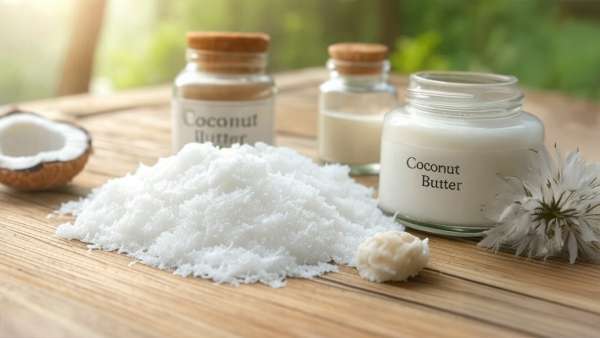Coconut butter
Coconut Butter: Health Benefits, Ancient Cures and Natural Remedies

Coconut butter is a superfood prized for its nutritional and therapeutic properties. Used for centuries in traditional medicine, it benefits the skin, digestion, immune system and metabolism. Discover how to incorporate it into your daily routine for health and beauty!
Nutritional Information per 100g
Coconut butter is rich in healthy fats and essential nutrients and is a valuable source of energy and therapeutic benefits.
- Calories: 660 kcal
- Carbohydrate: 6g
- Total fat: 65g
- Saturated fat: 57g
- Protein: 7g
- Fiber: 16g
- Sugar: 2g
- Vitamins: E, K
- Minerals: Iron, Magnesium, Potassium
How is coconut butter made?
Coconut butter is made from ripe coconut pulp and is a 100% natural product. The process is simple and can be made at home.
Traditional method
- The ripe coconut is split and the pulp is extracted.
- It is finely grated or blended to a paste.
- Press or squeeze to separate the coconut milk.
- The resulting liquid is left to rest for several hours until the fat layer (coconut oil) separates.
- This solidified layer is collected and gently processed into coconut butter.
Modern method
- Cold pressing is used to extract the butter directly from the coconut pulp.
- No high temperatures are applied to preserve the nutritional properties.
- The final product has a creamy texture and an intense coconut flavor.
Coconut butter is a versatile ingredient and can be used in both food and cosmetics.
Benefits of Coconut Butter
- Improves skin health: It moisturizes and reduces inflammation and has an antibacterial effect.
- Boosts the immune system: Contains lauric acid, which fights bacteria and viruses.
- Supports digestion: Helps nutrient absorption and fights digestive problems.
- Accelerates metabolism: The MCT fats in coconut butter are rapidly converted into energy.
- Regulates blood sugar levels: May help prevent type 2 diabetes.
- Improves brain function: May be beneficial in preventing Alzheimer's.
- Protects the heart: Consumed in moderation, may help balance cholesterol.
- Powerful antioxidant: Fights free radicals and premature ageing.
Contraindications and Adverse Effects
- Increased cholesterol: May increase LDL cholesterol if consumed excessively.
- Digestive problems: Consumed in large amounts may cause diarrhea or gastric discomfort.
- Allergic reactions: Some people may have allergies to coconut.
- Drug interactions: May affect absorption of certain medications.
How Administered or How May Be Consumed
- Added to smoothies and shakes for extra energy.
- External use as a moisturizing lotion for skin and hair.
- Cooked and fried, replacing refined oils.
- Combined with honey for a natural cough remedy.
- As a face mask to moisturize the skin.
- Direct consumption (1 teaspoon/day) to boost immunity.
Did you know...?
- Coconut butter has been used for centuries in Ayurvedic medicine.
- It has natural antimicrobial and antifungal properties.
- It can be used as a natural toothpaste.
- In some cultures it is considered an elixir of youth.
- Helps cell regeneration and reduce stretch marks.
- Used as a natural cleanser.
- Can replace shaving cream for a smooth shave.
- Contains medium-chain triglycerides (MCT), ideal for ketogenic diets.
Conclusion
Coconut butter is a versatile ingredient with multiple health and beauty benefits. Used in moderation, it can improve digestion, metabolism and skin health. However, excessive consumption should be avoided to prevent adverse effects.
Comments